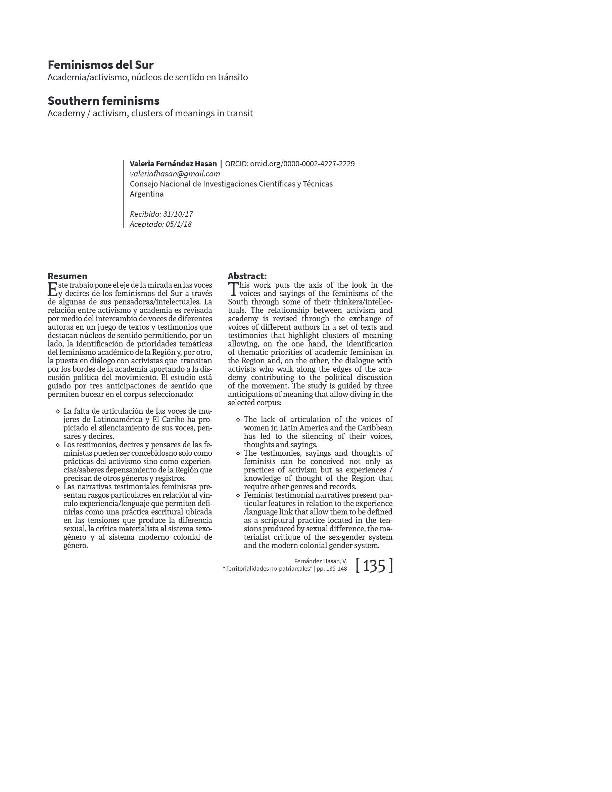Artículo
Este trabajo pone el eje de la mirada en las voces y decires de los feminismos del Sur a través de algunas de sus pensadoras/intelectuales. La relación entre activismo y academia es revisada por medio del intercambio de voces de diferentes autoras en un juego de textos y testimonios que destacan núcleos de sentido permitiendo, por un lado, la identificación de prioridades temáticas del feminismo académico de la Región y, por otro, la puesta en diálogo con activistas que transitan por los bordes de la academia aportando a la discusión política del movimiento. El estudio está guiado por tres anticipaciones de sentido que permiten bucear en el corpus seleccionado: 1. La falta de articulación de las voces de mujeres de Latinoamérica y El Caribe ha propiciado el silenciamiento de sus voces, pensares y decires. 2. Los testimonios, decires y pensares de las feministas pueden ser concebidos no solo como prácticas del activismo sino como experiencias/saberes de pensamiento de la Región que precisan de otros géneros y registros. 3. Las narrativas testimoniales feministas presentan rasgos particulares en relación al vínculo experiencia/lenguaje que permiten definirlas como una práctica escritural ubicada en las tensiones que produce la diferencia sexual, la crítica materialista al sistema sexo-género y al sistema moderno colonial de género. La identificación de las marcas de producción textual permite definir luego del análisis un género escritural con perfiles propios donde pueden establecerse temas pendientes, temas urgentes y temas de debate que se juegan en el entramado de nuestros feminismos del Sur aportando al debate teórico y político del movimiento. This work puts the axis of the look in the voices and sayings of the feminisms of the South through some of their thinkers / intellectuals. The relationship between activism and academy is revised through the exchange of voices of different authors in a set of texts and testimonies that highlight clusters of meaning allowing, on the one hand, the identification of thematic priorities of academic feminism in the Region and, on the other, the dialogue with activists who walk along the edges of the academy contributing to the political discussion of the movement. The study is guided by three anticipations of meaning that allow diving in the selected corpus: 1. The lack of articulation of the voices of women in Latin America and the Caribbean has led to the silencing of their voices, thoughts and sayings. 2. The testimonies, sayings and thoughts of feminists can be conceived not only as practices of activism but as experiences / knowledge of thought of the Region that require other genres and records. 3. Feminist testimonial narratives present particular features in relation to the experience / language link that allow them to be defined as a scriptural practice located in the tensions produced by sexual difference, the materialist critique of the sex-gender system and the modern colonial gender system. The identification of the marks of textual production allows to define after the analysis a scriptural genre with its own profiles where pending issues can be established, urgent topics and debate topics that are played in the framework of our Southern feminisms contributing to the theoretical and political debate of the movement.
Feminismos del Sur: academia/ activismo, núcleos de sentido en tránsito
Título:
Southern feminisms: Academy / activism, clusters of meanings in transit
Fecha de publicación:
01/2018
Editorial:
Universidad Nacional de San Juan. Facultad de Ciencias Sociales. Instituto de Investigaciones Socioeconómicas
Revista:
Rev IISE
ISSN:
2250-5555
Idioma:
Español
Tipo de recurso:
Artículo publicado
Clasificación temática:
Resumen
Archivos asociados
Licencia
Identificadores
Colecciones
Articulos(INCIHUSA)
Articulos de INST. DE CS. HUMANAS, SOC. Y AMBIENTALES
Articulos de INST. DE CS. HUMANAS, SOC. Y AMBIENTALES
Citación
Fernández Hasan, Valeria; Feminismos del Sur: academia/ activismo, núcleos de sentido en tránsito; Universidad Nacional de San Juan. Facultad de Ciencias Sociales. Instituto de Investigaciones Socioeconómicas; Rev IISE; 11; 11; 1-2018; 135-148
Compartir




